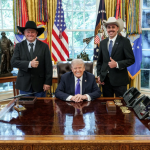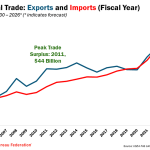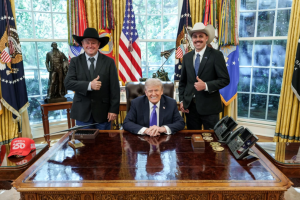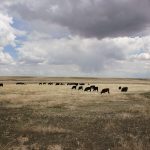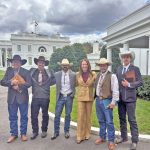Trump responds to cattle ranchers concerns over Argentinian beef imports

On Wednesday, Ag Secretary Brook Rollins released a plan “to strengthen the American beef industry, reinforcing and prioritizing the American rancher’s critical role in the national security of the United States.”
Before that plan came out it was a wild week in cattle country after President Donald Trump suggested that the U.S. should increase beef imports from Argentina to bring down beef prices at the grocery store. As I write this on Thursday, it is still not clear to me if the plan to raise the tariff rate quota on Argentine beef to 80,000 metric tons will still be implemented.
As you can imagine, the prospect of importing more beef from Argentina not only negatively impacts the U.S. cattle market, but it has also led to much criticism from ranchers. Most of these ranchers probably voted for Trump and were voicing their concerns in hopes that he would come to a different conclusion on how to deal with high beef prices.
It’s a fact that the U.S. cattle herd is at a 75-year low and that beef prices are higher in response. That’s how the market works. This happened because of years of high input costs, low beef prices and a drought that reduced the nation’s cow herd.
In other words, today’s beef prices are where, or possibly still less than, they should be as dictated by the laws of supply and demand.
“The cost of producing beef today is accurately represented in the consumer markets where it is sold,” said Justin Tupper, President of the U.S. Cattlemen’s Association. “Ranchers are facing historic highs for feed, fuel, labor, and land — and those costs have risen far faster than beef prices on grocery shelves.”
Farmers and ranchers take very seriously their job of feeding the world and, especially with higher cattle prices, would do anything to grow their herds. But they also need to make a profit.
Trump’s suggestion that some of those profits should go to Argentinian ranchers seemed a bridge too far for many especially after Agriculture Secretary Brook Rollins said earlier that the government would not intervene by providing direct payments to beef producers to combat higher beef prices.
“We have no current plans to offer any payment to beef producers. We see how the government getting involved can completely distort the markets. And so currently there will be no plan, no plan is even under consideration, to insert ourselves through payments into the beef cattle industry,'” Rollins said. “Instead, the plans will focus on opening up more working lands and expanding risk-mitigation tools, Rollins said.”
So we don’t want to distort the market by paying beef producers to shore up their herds, but we will distort the market by buying more beef from other countries?
Not to mention, the U.S. already spends more money on Argentina beef imports, compared to what we export to that country. For a president who has spent most of the first year of his second term in office trying to reduce the U.S. trade deficit, it would seem to be unconscionable for him to seek more imports from a country where we already have a trade deficit.
I believe, for the most part, cattle ranchers support President Trump. His comments and the action plan released by the U.S. Department of Agriculture prove that he and his administration are listening to cattle ranchers.
And I get it, he is also listening to consumers. So, while I was writing this, I decided to go to the grocery store in Cheyenne, Wyo., just to see how high beef prices have risen here. I found ground beef on sale at Albertsons for $4.97 per pound, boneless chuck cross rib roasts were $6.99 a pound, boneless skinless chicken breasts were $5.99 per pound and a pound of Atlantic salmon was $9.99 a pound. It would seem to me that beef prices are in line with other meats, at least in Cheyenne.
As for the reaction of ranchers to the Argentina imports, you can’t blame them for having such a strong response to a suggestion to increase beef imports when they are finally making some money after many years of losses.
Trump needs to stick to his “America First” slogan and continue his dialogue with cattle producers so they can make up for the many years of hard times in the business, and brace themselves for the inevitable increase in the cow herd.
Criticizing Trump doesn’t mean that they are turning against him, they are just fighting for their livelihood.
For more details of USDA’s plan to strengthen U.S. beef industry, go to https://tinyurl.com/359j3c6t.

